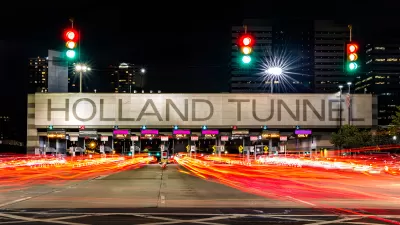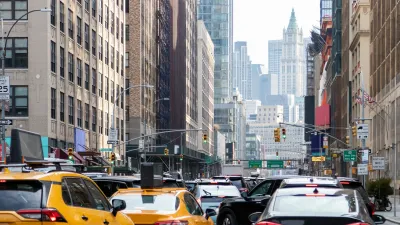As New York City’s congestion pricing program gets closer to implementation, a proposed pricing scheme would charge $15 at peak traffic hours.

A proposed pricing scheme for New York City’s congestion pricing program could put peak-hour tolls at $15, weekend tolls at $9, and off-peak tolls at $3, writes Dave Colon in Streetsblog NYC.
The plan was developed by Charles Komanoff and Gernot Wagner, who say “A $15 peak toll to enter the Central Business District would be more politically palatable than the $23 maximum fee floated in the MTA's official environmental review of the program.”
“The Komanoff/Wagner plan doesn't conform to any of the scenarios that the MTA modeled for the federal government in its environmental assessment, but seeks to charge drivers based on the impact of their trips on traffic — hence the lower toll at night when traffic is negligible, the pair said.” The study authors also recommend rejecting all requests for exemptions, but support rebates for certain tunnels, which drop drivers directly into the congestion zone.
In a statement emailed to Planetizen before the pricing plan was announced, Samara Karasyk, president of the Hudson Square Business Improvement District, said her organization supports congestion pricing. According to Karasyk, “Traffic headed to the Holland Tunnel is a part of daily life in Hudson Square, but the creative use of public spaces and temporary solutions, like open streets, have made our neighborhood safer and more enjoyable for pedestrians. Implementing a permanent congestion pricing program that will reduce traffic in Hudson Square and other parts of our downtown is key to creating neighborhoods where people want to live, work, and visit.”
FULL STORY: Is A $15 Toll The ‘Political Sweet Spot’ for Congestion Pricing?

Alabama: Trump Terminates Settlements for Black Communities Harmed By Raw Sewage
Trump deemed the landmark civil rights agreement “illegal DEI and environmental justice policy.”

Planetizen Federal Action Tracker
A weekly monitor of how Trump’s orders and actions are impacting planners and planning in America.

How Atlanta Built 7,000 Housing Units in 3 Years
The city’s comprehensive, neighborhood-focused housing strategy focuses on identifying properties and land that can be repurposed for housing and encouraging development in underserved neighborhoods.

In Both Crashes and Crime, Public Transportation is Far Safer than Driving
Contrary to popular assumptions, public transportation has far lower crash and crime rates than automobile travel. For safer communities, improve and encourage transit travel.

Report: Zoning Reforms Should Complement Nashville’s Ambitious Transit Plan
Without reform, restrictive zoning codes will limit the impact of the city’s planned transit expansion and could exclude some of the residents who depend on transit the most.

Judge Orders Release of Frozen IRA, IIJA Funding
The decision is a victory for environmental groups who charged that freezing funds for critical infrastructure and disaster response programs caused “real and irreparable harm” to communities.
Urban Design for Planners 1: Software Tools
This six-course series explores essential urban design concepts using open source software and equips planners with the tools they need to participate fully in the urban design process.
Planning for Universal Design
Learn the tools for implementing Universal Design in planning regulations.
Jessamine County Fiscal Court
Caltrans
Institute for Housing and Urban Development Studies (IHS)
City of Grandview
Harvard GSD Executive Education
Toledo-Lucas County Plan Commissions
Salt Lake City
NYU Wagner Graduate School of Public Service





























